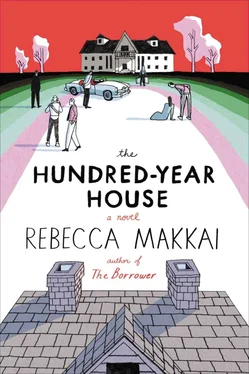Miriam explained it to the group. “There’s been a lot of good and a lot of bad at Laurelfield since artists last gathered here. Those of us who’ve been working to make this all happen — we wanted to clear away the past to make room for the new, and the amazing, and the good. And so tonight we’re going to burn some bad art.”
The crowd laughed, and Doug held up the farmhouse painting, removed from its frame, and tossed it on the fire. It cracked and hissed and then it blazed away.
Leland personally threw in, with great relish, some horrendous poems he’d written after a breakup five years back. Miriam contributed what was left of the yellow dress piece — clawed to scraps by Hidalgo, never really salvageable. Doug threw in three slim paperbacks: Melissa Calls the Shots, Melissa takes a Bow, Cece Makes the Grade .
“Oh, I used to love those!” said someone across the fire. “They were terrible!”
As the night grew cool the artists gathered closer to the blaze for a minute, and then they headed off. They had work to do: canvases to prime, desks to arrange, poems to start.
Doug turned to Miriam and said, “Let’s get the Happensack right now. We’ll be too busy tomorrow.”
“We don’t have anything to patch the wall with. We’ll have a gaping hole for days.”
He shook his head. “I want it in the library when they come down to breakfast.”
—
Up in the coach house, they took turns hammering a chisel to break the thick paint seal around the edge, then going at it with the pry bar, getting behind each of the four nailed corners in turn, a bit at a time.
Doug took a shift as Miriam held the edges of the board, ready to catch its full weight if it came loose. He felt utterly happy. It was a happiness beyond the colony, beyond the triumph of the day. He didn’t know, after all the disastrous things that had happened, why he should be so profoundly, overwhelmingly satisfied with life. But he was.
The board gave a thrilling crack and Miriam wrested it backward, the nails sliding out, and Doug wasn’t sure if he should grab the board or catch her from behind. But moreover — in that exact moment, as he watched her stepping back, finding her balance, panting — he felt as if something had dislodged inside him as well. He said, “Put it down.” He let the pry bar fall to the floor.
“No, I’ve got it.”
“Please put it down.”
“Why?”
“Put it down.”
She did, she leaned it against the wall, and he stood and hooked two fingers into the collar of her shirt and pulled her, stumbling, toward him. In front of the gaping mouth of the wall, he kissed her. There would be time later to move the board, and time to shine flashlights into the wall, and time to replace the small orange tile that had clattered to the floor. He’d been waiting only three seconds for her, but he felt he’d been waiting a century, as if there were nothing more obvious, more necessary, in the world.

After all, Grace had grown up with stories about attics. A Little Princess , and Jane Eyre , and a hundred campfire ghost stories. The one, for instance, about the bride trapped in the trunk on her wedding night. And that spring on the honeymoon she’d picked up Anne Frank’s diary at the English bookshop in Paris. When George disappeared on the third day, she sat in La Rotonde with her open book, a glass of Chablis and a bowl of mussels. She’d brought the book as a shield, hoping she could pass for a young art student, a girl who dined alone once a week when she tired of the French boys in her sculpture class. She still looked twenty, it was true. The waiter called her Mademoiselle .
Her water refilled as if from an underground spring. The sun turned to twilight and then streetlamps, the crowd thickened around her, but the waiter never brought the addition , just more bread and then, with a wink, more wine. By then the book had plunged her into a world so vivid that the Paris around her seemed the fiction. She was Anne Frank, and this Paris street was a dream after death. She returned to the hotel around midnight to finish the book in bed. When George banged on the door twenty minutes later, his key lost forever, it was too easy to pretend he was a Nazi ripping the bookcase from the Annex door. She lay in bed and tried not to breathe. He shouted and kicked and tried to force the handle. Only when he went silent, presumably starting down the hall to wake the night manager, did she jump up and turn the knob.
“I was asleep,” she said.
He steadied himself, his eyes swimming so fast that she knew he saw three of her. He smelled sweet and complicated — like whiskey and cigars and fifty women — and she unbuttoned his shirt. He knocked the door closed with his elbow.
She lay back across the bed. She’d bought a pale green nightgown that afternoon on the Rue de Rivoli. She pressed her white foot to his thigh. She said, “And I was alone all day thinking about you. You’ll have to make it up to me.”
—
So was it such a surprise back here, in this vast and disconsolate brick trap, when the smell of Paris had faded from her palate, when George’s disappearances left her not ensconced in a café of strangers but humiliated in front of the staff, that she’d claim the attic for her haven? She figured she loved it for the reason we always love attics, for the reason they figure in our dreams: because they are the hidden rooms where we store our pasts. Where we stick the things we can’t bear to throw away but hope we never have to see again.
And more practically — it had cooled with the fall air, and here she could sit, invisible, and see everything. The people below were tiny and featureless, dolls around a dollhouse: Max the driver, who claimed he’d been at Laurelfield twenty-five years, more than half his life. Mrs. Carmichael the housekeeper. Beatrice and Ludo in the garden. Rosamund, the cook. The mailman, coming and going. The dairy man, coming and going. Peculiar little Amy, Max’s niece, who showed up one day in July startled as a deer and just stayed and stayed. George, taking off in the Capri with Max or in the Darrin without him, or just lurking the grounds, leering at Beatrice as she bent over the squash bed, leering at Amy as she carried linens from the big house to the coach house.
Grace imagined bringing darts up here, perfecting her aim, and launching them at the unsuspecting dolls. One in Max’s tire. One in Amy’s round posterior. One right in the muscle of George’s beautiful arm. One in the koi pond, one in the milk truck. Pop.
What she brought up instead was food, just a bit, and stored it on the windowsill. A loaf of sliced bread, a pot of strawberry jam, five long and knobby carrots. She liked to calculate how long it would last her, if she decided to go missing. One week, she decided. And then down she would climb, skinny as a wraith.
—
On the tenth of October two strange things happened, and so she knew there would be a third.
The first was that a witch walked into the coach house. Not a real witch, this being the modern day and the rational world. Still, in October, to dress in flowing black like that, hunched at the waist against the wind, the woman was rather asking to be burned at the stake. She’d arrived by taxi from lord knew where, Salem perhaps, and darted into the coach house as if she belonged. Grace’s first thought was that the witch was Amy’s mother, Max’s sister, come to claim her renegade daughter at last, but when Amy walked out toward the garden ten minutes later, untroubled and unhurried, she knew it couldn’t be. Grace pulled her bird-watchers off the filing cabinet and trained them on the coach house’s second story, above the two open garage doors. She could see them through the windows of the balcony door. The witch sat at the kitchen table, her hair in a low, gray chignon. Max sat across — there was his dark hair — his hands going up and down from the table to his mouth, eating or smoking or drinking. But that was all she could tell.
Читать дальше













